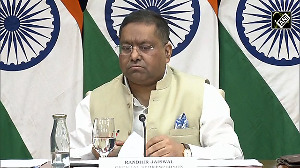A report on globalisation prepared by the International Labour Organisation has said decent opportunities for workers will create a more widespread support for globalisation, instead of a rush towards greater market access.
The report titled `A Fair Globalisation-Creating Opportunities for All' has asked for the reframing of the policies to make them labour-friendly, including a minimum set of globally applicable rules for labour.
The comment is significant in the context of the demand in countries like India to relax employment conditions in areas like the special export zones.
The report says "stronger action is required to ensure respect for core labour standards in export processing zones and more generally in global production systems". This will ensure that labour is not marginalised by the needs of globalisation.
The report says it is therefore necessary that along with fair rules for trade and FDI flows, there must be similar rules for cross-border movement of people.
Stating that more than 10 million people cross borders annually, it says a multilateral regime for such movement will increase global productivity substantially. Referring to India, it says such a diaspora effect has stimulated the growth of high-tech industries in the country.
The report has urged the creation of a multilateral framework to govern international migration. It says this will develop mutually beneficial ways in which countries can tap the skill set of migrants, especially in cases of brain-drain.
It has endorsed a proposal made by noted economist and Delhi University Vice-Chancellor Deepak Nayyar, which involves giving dual citizenship to migrants and providing tax and other incentives to encourage them to return home.
This skill circulation will benefit both developed and developing countries, it says. Nayyar is also a member of the World Commission on the Social Dimension of Globalisation, which wrote the report.
The 168-page report is the result of several national, regional and sub-regional dialogues that the World Commission held with government leaders, business, trade union leaders and civil societies across the world over two years.
It says an urgent rethink of current policies and institutions, along with accelerating global employment possibilities hold the key to reduce social tension within countries and also among them.
Towards this end, it has asked for a new operational tool for upgrading the extent of policy coordination among the multilateral institutions on issues where their policies intersect.
There should be enhanced coordination of macro-economic policies among nations with a slower movement towards capital account convertibility, along with a wider and more democratic participation of people in the policy making process, the report says.







 © 2025
© 2025